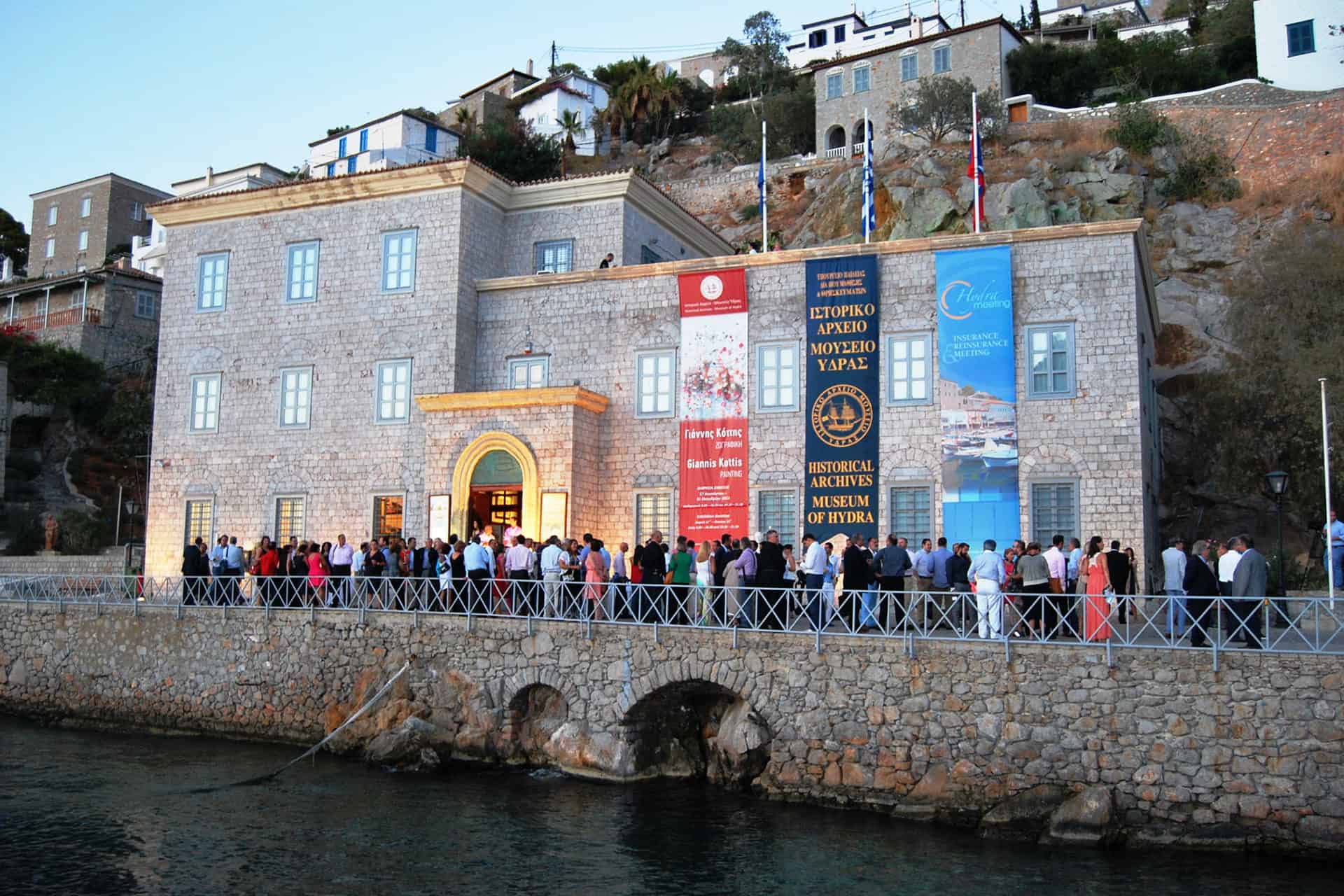Hydra itself is a living museum. Few are the places where time seems to have stopped, and the visitor can walk the streets of a place—in this case, a breathtakingly beautiful one—and have essentially the same sights, sounds, and experience as the Hydriot during the island’s 1821 glory days.
Blessed by a rough geography and equally draconian building codes, Hydra construction must conform to a style from the 1820s era. On its cobblestoned and flagstoned streets, often as not washed regularly by the residents, there are no cars or motorcycles that tyrannize so many Greek island venues. Here the traffic is two (or four) footed, just as in 1821, and the sights and sounds (barring the various genres of often loud music from various locales) would be familiar to the grizzled sailors of that celebrated era.
Of course, the museum experience in Hydra does not end there; in fact, it should begin—or end—at the Historical Archive-Museum of Hydra. I say this because the museum, housed in a stately Hydriot-grey former captain’s home, lies a stone’s throw from the ship pier that brings the visitor to the island. As such, it is a perfect visit upon arrival or departure, but make sure you give it time because the venue will take you in and take you over, providing a readily tangible historical context to the island outside.
When we lived in Greece, practically every time I visited Hydra, a visit to the museum was in order, because each time I took away something else, and I usually had family in tow. Now that Hydra is once again “leading from the Front” in celebrating the 200th anniversary of the Greek War of Independence, the museum, its relics, and its massive archive will play a key role.
I thought that it would be best to chat with the Museum Director, Dina Adamopoulou. A native of Rhodes, another beautiful and historic Aegean island, Adamopoulou has been the director for thirty-one years, taking the museum from a construction site to the beating heart of Hydriot culture and society.
I caught up with Dina the way everyone does in these days of Coronavirus Quarantine—digitally from our mutual lockdown locations—to talk to us a bit about this fantastic venue.

Historical Archives – Museum of Hydra
Please tell us a bit about your background, education, and when and how you came to Hydra?
My education was in history and archeology from the University of Athens, during which I worked on prehistoric excavations as well as concentrating on the period of the Greek Revolution of 1821. I have participated often in seminars on archival processes at the National Center for Public Administration.
I arrived on Hydra 31 years ago, in 1989, and I assumed leadership over the Historical Archive and Museum of Hydra (under the Ministry of Education and the professional supervision of the General State Archives). I took over an incomplete museum building, basically a construction site whose completion I oversaw and the compilation and housing of the priceless archives and over 20,000 documents of the Hydriot archives.
If Hydra had a “brand,” how would we describe it? What is the role of the museum in furthering “Brand Hydra”?
Hydra is a unique island, not only from a historical and architectural perspective but also from its atmosphere and environment. It could be the “Capri” of Greece. Our museum plays a leading role in the cultural life of the island, as for the last 25 years it is the venue for cultural events of high quality as might be expected from a museum. Further, the Archive-Museum houses the relics, documents, and other materials related to the Revolution. Here, the visitor may experience in all its magnificence the underappreciated role of Hydra in the naval history of that great [Independence] struggle. Here one can uncover the island’s historical identity. I believe that every visitor—Greeks or foreigners—will get to know and to understand our island’s history.
Hydra has a constant stream of visitors, and of those, how many visit the museum? How many are Greeks, as opposed to foreigners?
We annually welcome 18,000 to 20,000 visitors per year. About two-thirds of the visitors are Greeks who come either in organized groups or individually. The rest are foreigners. Many schools also have organized visits to our museum.
I realize that, as a Hydriot myself, I am biased, but the Museum and Archives are truly a treasure, how can we expand and build awareness?
The Museum and Archives are working single-mindedly and feverishly towards an outward orientation to the public. Aside from the permanent collections displayed in the museum, we organize every year (particularly in the summertime) a series of cultural events, seminars, theatrical and folklore events, book signings/presentations, and concerts. Further, the museum operates a very interesting and informed Museum Shop for visitors to pick up books and other items to recall their visit and to learn more about the museum. In such a manner, the public does not “go to the museum, but the museum itself goes to the public.”
Regarding the upcoming “Hydra: Rock of Liberty 1821-2021” Initiative, what role will the museum play, and how can those of us in the Greek Diaspora participate and assist?
With the Bicentennial of 1821 in mind, and as part of a wider policy of outward orientation by the Ministry and the General State Archives, the Historical Archive and Museum of Hydra have decided to send a portion of its collection to two or three museums in the United States and Australia where there are large Diaspora Greek Communities. Our fellow countrymen in the Diaspora, who support the mother country, can assist in various ways in the logistics of this matter, whether through local connections, agreements with local museums and providers, or financial assistance, to make this initiative happen.
Now that we are all “Staying at Home” due to the Coronavirus Outbreak, the Internet is our main means of communication, and for people who cannot visit the museum anyway due to distance and cost, does the museum have a “Digital Presence” and do you have plans to expand this means of building awareness?
The Hydra Museum has already put on its website and on Facebook a means for a “Digital Encounter” with the museum. With the assistance of the European Union program “INCEPTION,” and with the valued cooperation of VBC, we created a three-dimensional museum tour that allows the visitor an “Augmented Reality/Virtual Reality” experience inside the museum. In the near future, this experience will be further enhanced with new features and information in Greek and English.




